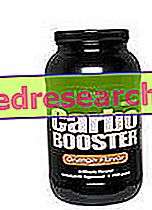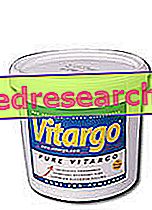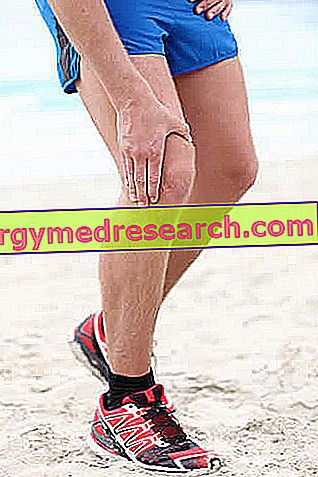
About Carbo BOOSTER - ULTIMATE NUTRITION
Carbo BOOSTER - ULTIMATE NUTRITION
Food supplement based on Maltodextrin and isomaltulose
FORMAT
1kg orange flavored package
Composition : Maltodextrin - Isomaltulose - Citric acid - Aromas and artificial colorings - Acesulfame potassium and aspartame
Per daily dose (75gr = 2 scoops)
Energy value: 280 Kcal
Proteins 0 gr
Carbohydrates 70 gr
Fats 0 gr
Sodium 50 mg
CONTAINS PHENYLALANINE
Maltodextrin - carbohydrates obtained from the controlled and partial hydrolysis of corn starch, rice or potatoes. Maltodextrins can be considered as oligosaccharide chains consisting of different glucose units, bound by alpha 1-4 glycosidic bonds. Like the other complex carbohydrates found in nature, the digestion of these molecules begins in the mouth by salivary amylase, and is completed in the small intestine with the action of pancreatic amylase. The free glucose molecules that originate are then absorbed by the apical membrane of the enterocytes and from here they are introduced into the circulatory stream, where they can be used by the body according to the metabolic-nutritional requirements. The digestion times of maltodextrins vary depending on the structure and complexity, therefore based on the number of monosaccharide units that compose them. To standardize the classification we used the word Dextrose Equivalence, defining maltodextrins with high ED as those with faster digestion and absorption, and maltodextrins with low ED as those with slower and gradual absorption.
The presence of a different complexity, of a different glycemic and insulinemic response, allows the sportsman to be able to use the maltodextrins based on what are the nutritional and energy needs, and the related objective.
Carbohydrates of various kinds and maltodextrins in particular, can be used by sportsmen in the pre-training phase, in order to recharge the reserves of muscle glycogen, during training to support the performance, before a sprint or a ceiling, in the phase recovery to stimulate glycogen resynthesis and protein synthesis, or in the form of iso or hypotonic drinks to facilitate rehydration.

Compared to other sugars, it has also proved to be well tolerated even at high concentrations in healthy individuals, diabetic patients and those with cardiovascular problems.
Studies carried out on the consumption of isomaltulose during physical activity have shown that the gradual release of the two monosaccharides, optimizing the insulin response, can facilitate the oxidation of fatty acids compared to what sucrose is able to do.
Rationale - Carbo BOOSTER - ULTIMATE NUTRITION
Although supplementation with carbohydrate-based supplements may be effective, it must be considered that only a correct supplementary protocol can ensure the achievement of the set objectives. A classic example is the absence of ergogenic effects, following supplementation with carbohydrates of various kinds, in a well-fed organism, in which the reserves of muscle and liver glycogen are now saturated. It is also very important to choose the right type of maltodextrin in the supplementary protocol; in fact, it would be a serious mistake, for example, to take a high DE load of maltodextrin before an endurance performance, risking the subsequent reactive hypoglycemia with a decrease in muscular ergogenic abilities and athletic performance.
The integration with maltodextrin is therefore able to:
- Support muscle energy capabilities;
- Avoid muscle and amino acid catabolism;
- Improve athletic performance;
- Support the anabolic phase;
provided that this is carried out with scientific and rational criteria.
Recommended use by the company - Carbo BOOSTER - ULTIMATE NUTRITION
For an ideal energy intake, take 2 scoops (75 grams) dissolved in half a liter of water during physical activity.
Use in sports - Carbo BOOSTER - ULTIMATE NUTRITION
In light of what has been said in the Rational section, it appears clear that a standardized intake of this supplement does not exist, although it is recommended to supplement with 30 grams of maltodextrin for every hour of competition exceeded 90 '.
With a view to effective supplementation, it is indeed necessary to adjust the dosage of maltodextrins based on:
- Nutritional condition;
- Type of training;
- Duration and intensity of training;
- Goal to reach.
Instead it is necessary to consider the opportunity to prepare aqueous solutions of maltodextrin concentrated between 6% and 10%, in order to avoid the massive entry of water into the intestinal lumen (avoiding diarrhea and dehydration) and facilitate the absorption process.
Synergies
Maltodextrin + proteins: in the recovery phase, it could be useful in improving the anabolic window.
Maltodextrin + mineral salts: fundamental for the reintegration of salt water, if formulated in a hypo and isotonic drink.
Maltodextrin + arginine: it strongly enhances glycogen synthesis compared to maltodextrins only;
Maltodextrin + fructose: improves muscle oxidation of ingested carbohydrates compared to the administration of maltodextrin alone;
Maltodextrin + amino acids: before training, it significantly reduces muscle damage, supporting performance and reducing plasma levels of cratinkinase.
Maltodextrin + antioxidants: they can reduce the oxidative damage induced by intense physical exercise.
Side Effects Carbo BOOSTER - ULTIMATE NUTRITION
The side effects that may occur following the incorrect administration of maltodextrins can be short or long term.
In the short term, problems can usually occur in the gastrointestinal tract, with abdominal cramps, diarrhea, nausea and vomiting.
The long-term effects, on the other hand, could be compared to those obtainable with excessive nutrition, rich in simple carbohydrates (overweight, obesity and related pathologies).
Precautions for use Carbo BOOSTER - ULTIMATE NUTRITION
The product is contraindicated in cases of renal or hepatic disease, cardiovascular disease and / or hypertension, during pregnancy, during lactation and under 14 years.
This article, elaborated on the critical re-reading of scientific articles, university texts and common practice, is for informational purposes only and is therefore not a medical prescription. It is therefore always necessary to consult your doctor, nutritionist or pharmacist before starting to use any kind of supplement . Further information on the critical analysis of Carbo BOOSTER - ULTIMATE NUTRITION.
| BIBLIOGRAPHY |
Oxidation of combined ingestion of maltodextrins and fructose during exercise. Wallis GA, Rowlands DS, Shaw C, Jentjens RL, Jeukendrup AE. Med Sci Sports Exerc. 2005 Mar; 37 (3): 426-32. Pflugers Arch. 2003 May; 446 (2): 211-9. Epub 2003 Mar 4. Carbohydrate supplementation improves moderate and high-intensity exercise in the heat. Carter J, Jeukendrup AE, Mundel T, Jones DA. Carbohydrate mouth rinsing in the fed state: lack of enhancement of time-trial performance. Beelen M, Berghuis J, Bonaparte B, Ballak SB, Jeukendrup AE, van Loon LJ. Int J Sport Nutr Exerc Metab. 2009 Aug; 19 (4): 400-9. Carbohydrate ingestion during exercise does not delay the fatigue during the submaximal cycle exercise. Lacerda AC, Alecrim P, Damasceno WC, Gripp F, Pinto KM, Silami-Garcia E. J Strength Cond Res. 2009 Jul; 23 (4): 1276-81. J Physiol. 2009 Apr 15; 587 (Pt 8): 1779-94. Epub 2009 Feb 23. Chambers ES, Bridge MW, Jones DA. J Sports Med Phys Fitness. 2006 Jun; 46 (2): 248-56. Does a pre-exercise carbohydrate feed improve to 20-km cross-country ski performance?Francescato MP, Puntel I. Med Sci Sports Exerc. 2004 Dec; 36 (12): 2107-11. The effect of carbohydrate mouth rinse on 1-h cycle time trial performance.Carter JM, Jeukendrup AE, Jones DA. J Strength Cond Res. 2003 Feb; 17 (1): 20-5. The effect of liquid carbohydrate ingestion on repeated maximal effort exercise in competitive cyclists.Haub MD, Haff GG, Potteiger JA. Ergonomics. 2000 Oct; 43 (10): 1528-37. Effect of carbohydrate supplementation on simulated exercise of rugby league referees.MaClaren DPM, Close GL. This elite rugby league referees with a 6% maltodextrin (Md) solution while undertaking a simulated rugby league game Int J Sport Nutr. 1999 Sep; 9 (3): 241-50. Yaspelkis BB 3rd, Ivy JL. Int J Sport Nutr. 1997 Jun; 7 (2): 128-37. Glycemic and insulinemic responses to multiple preexercise carbohydrate feedings.Short KR, Sheffield-Moore M, Costill DL. Eight trained cyclists ingested 22.5, 45, or 75 total g maltodextrin and dextrose dissolved in 473 ml of water or an equal volume of placebo (PL) Eur J Appl Physiol Occup Physiol. 1997; 76 (6): 504-9. The effects of various beveragesJimenez C, Melin B, Koulmann N, Charpenet A, Cottet-Emard JM, Péquignot JM, Savourey G, Bittel J. Int J Sports Med. 1994 Nov; 15 (8): 466-71. Hormonal and metabolite responses to glucose and maltodextrin ingestion with or without the addition of guar gum.MacLaren DP, Reilly T, Campbell IT, Frayn KN. J Sports Med Phys Fitness. 1994 Sep; 34 (3): 263-70. Langenfeld ME, Seifert JG, Rudge SR, Bucher RJ. Am J Physiol. 1991 Jun; 260 (6 Pt 1): E883-90. Carbohydrate supplementation, glycogen depletion, and amino acid metabolism during exercise.Wagenmakers AJ, Beckers EJ, Brouns F, Kuipers H, Soeters PB, van der Vusse GJ, Saris WH. Med Sci Sports Exerc. 1989 Oct; 21 (5): 540-9. Exercise and training effects on gastric emptying of carbohydrate beverages.Rehrer NJ, Beckers E, Brouns F, Hoor ten F, Saris WH. Oxidation of Solid versus Liquid Carbohydrate Sources during Exercise. Pfeiffer B, Stellingwerff T, Zaltas E, Jeukendrup AE. Med Sci Sports Exerc. 2010 Mar 19. [Epub ahead of print] Med Sci Sports Exerc. 2010 Apr 16. [Epub ahead of print] Pfeiffer B, Stellingwerff T, Zaltas E, Jeukendrup AE. Carbohydrate gel, it is absorbed and oxidized in the same way compared to a drink. |



